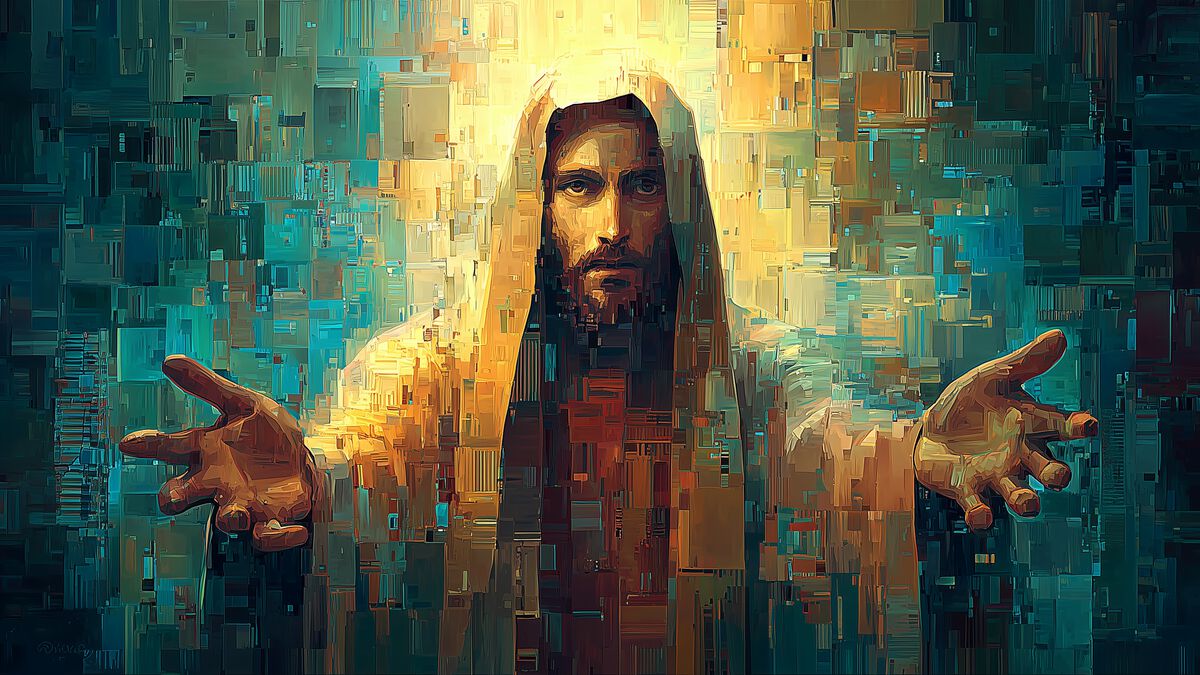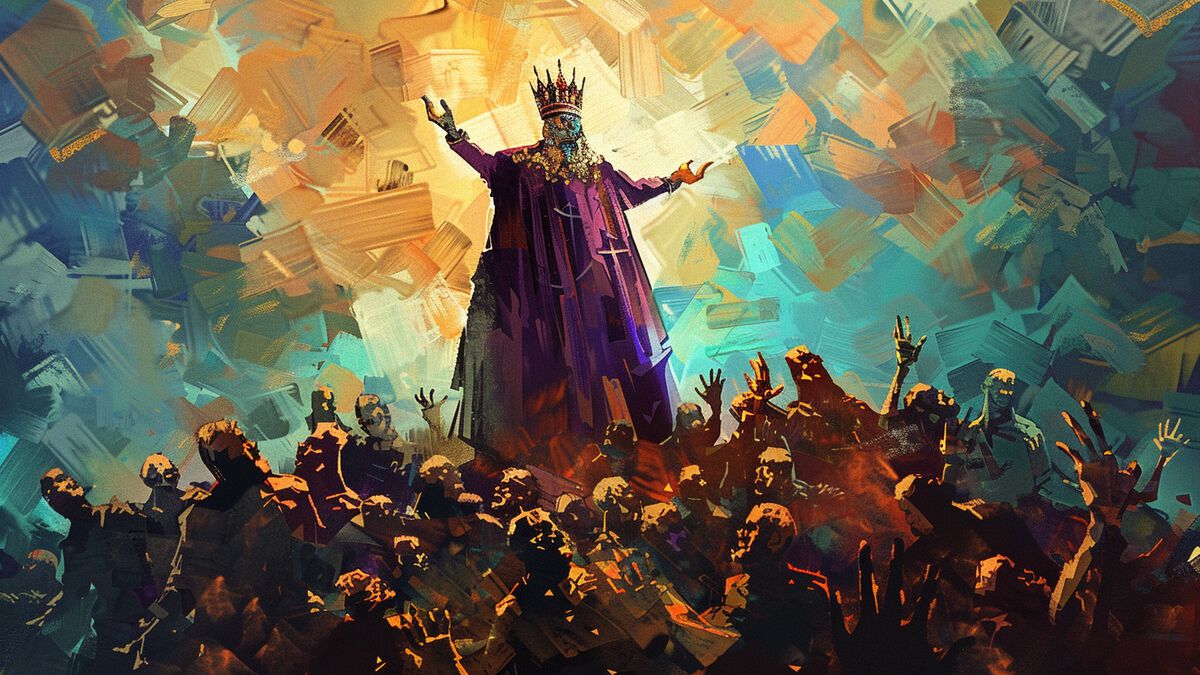Jesus as Messiah
Lincoln Cannon
11 December 2005 (updated 3 January 2026)
This is an edited transcript of a talk that I gave to my local Church congregation. Leaders asked that I speak on “Jesus in his role as messiah.” I first address what it means to be a messiah generally, and afterwards explain how Jesus, in particular, is a messiah.
The English word “messiah” comes from a Hebrew word that means “anointed.”
For thousands of years throughout the world, ancient and modern communities have performed ceremonies in which individuals have been anointed:
-
Native Australians have anointed themselves with fat from the remains of their dead to transfer the virtues of the dead to the survivors.
-
Likewise, East African Arabs and Native Americans have anointed themselves with various animal oils, such as lion fat for courage and buffalo oil for endurance.
-
Hindus have anointed themselves and their homes with butter made from cow milk to repel demons.
-
Europeans have anointed individuals with oil to designate them as leaders.
Generally speaking, these communities have recognized anointed individuals to be empowered to overcome evil such as possession, weakness, fear, or death; manifest virtue such as freedom, strength, courage, or life; and lead the community.
The ancient Hebrew community also performed anointing ceremonies. We read about some of these in the Bible. For example, the book of Exodus describes how Aaron and his sons were to be anointed as they became priests:
“And Aaron and his sons thou shalt bring unto the door of the tabernacle of the congregation, and shalt wash them with water. And thou shalt take the garments, and put upon Aaron the coat, and the robe of the apron, and the apron, and the breastplate, and gird him with the curious girdle of the apron: And thou shalt put the miter upon his head, and put the holy crown upon the miter.
“Then shalt thou take the anointing oil, and pour it upon his head, and anoint him. And thou shalt bring his sons, and put coats upon them. And thou shalt gird them with girdles, Aaron and his sons, and put the bonnets on them: and the priest’s office shall be theirs for a perpetual statute: and thou shalt consecrate Aaron and his sons.”
The Bible thereafter refers to prophets, priests, and kings as “anointed” or messiahs:
-
The books of Chronicles and Psalms each refer to prophets as messiahs.
-
Throughout the book of Leviticus, Aaronic priests are called messiahs.
-
In the books of Samuel, Chronicles, and Psalms, the Hebrew kings Saul and David are called messiahs.
-
In the book of Isaiah, the Persian king Cyrus is called a messiah.
The Hebrew community recognized these messiahs, as other communities have recognized their anointed, to be empowered to overcome evil, manifest virtue, and lead the community. In the beginning, their priests taught them. At the height of power, their kings protected them. Through centuries of oppression, their prophets wrote of future messiahs that would liberate them.
The prophet Isaiah wrote:
“The Spirit of the Lord GOD is upon me; because the LORD hath anointed me to preach good tidings unto the meek; he hath sent me to bind up the brokenhearted, to proclaim liberty to the captives, and the opening of the prison to them that are bound; To proclaim the acceptable year of the LORD, and the day of vengeance of our God; to comfort all that mourn; To appoint unto them that mourn in Zion, to give unto them beauty for ashes, the oil of joy for mourning, the garment of praise for the spirit of heaviness.”
Hundreds of years later, the prophetic visions of Isaiah and the other Hebrew prophets were fulfilled when the Spirit of God anointed Jesus of Nazareth. And he became what it means to be a messiah.
Like the word “messiah”, the English word “christ” comes from a Greek word that means “anointed.” The words “christ” and “messiah” mean the same thing.
When we speak of “Jesus Christ,” we are not saying that Jesus’ last name is “Christ.” We are saying that Jesus is a christ. When we speak of “Jesus Christ,” we are saying that Jesus is a messiah.
Like the anointed prophets, priests, and kings before him, yet more so than any before or since, Jesus Christ is empowered to overcome evil, manifest virtue, and lead the community. He is born in humility, teaches wisdom as a child in the temple, is baptized and anointed messiah, gathers disciples and teaches love to the multitudes, performs healings and works miracles, suffers the misery of sin in the garden and the pain of death on the cross, and rises from the garden tomb in glorious immortality. We still feel his words confirming our faith:
“Come unto me, all ye that labour and are heavy laden, and I will give you rest. Take my yoke upon you, and learn of me; for I am meek and lowly in heart: and ye shall find rest unto your souls. For my yoke is easy, and my burden is light.”
“These things I have spoken unto you, that in me ye might have peace. In the world ye shall have tribulation: but be of good cheer; I have overcome the world.”
“I am the resurrection, and the life: he that believeth in me, though he were dead, yet shall he live: And whosoever liveth and believeth in me shall never die.”
The gospel and atonement of Jesus Christ save us spiritually, from the misery of sin. As Adam left the garden, our sin in conflicting desires emerged. As Moses descended the mountain, our misery in guilt under the law followed. However, inspired by Christ, the prophet Nephi saw beyond the misery of sin:
“For we labor diligently to write, to persuade our children, and also our brethren, to believe in Christ, and to be reconciled to God; for we know that it is by grace that we are saved, after all we can do.
“And, notwithstanding we believe in Christ, we keep the law of Moses, and look forward with steadfastness unto Christ, until the law shall be fulfilled. For, for this end was the law given; wherefore the law hath become dead unto us, and we are made alive in Christ because of our faith; yet we keep the law because of the commandments.
“And we talk of Christ, we rejoice in Christ, we preach of Christ, we prophesy of Christ, and we write according to our prophecies, that our children may know to what source they may look for a remission of their sins.
“Wherefore, we speak concerning the law that our children may know the deadness of the law; and they, by knowing the deadness of the law, may look forward unto that life which is in Christ, and know for what end the law was given. And after the law is fulfilled in Christ, that they need not harden their hearts against him when the law ought to be done away.”
Furthermore, the resurrection and immortality of Jesus Christ save us physically, from the pain of death. Adam has died. Jesus Christ has died. However, inspired of Christ, the prophet Job saw beyond the pain of death:
“For I know that my redeemer liveth, and that he shall stand at the latter day upon the earth: And though after my skin worms destroy this body, yet in my flesh shall I see God:”
Jesus Christ, through our faith in his power to overcome evil and manifest virtue, leads our community beyond the misery of sin and the pain of death to fulness of joy in immortality and eternal life. In this, like the anointed of ancient and modern communities throughout the world, like the prophets, priests, and kings of the Hebrew community, Jesus is a messiah, and more: he is our messiah, our prophet, priest, and king, and our anointed: the power of God to our salvation and exaltation.



